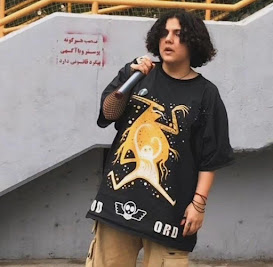She is bold, passionate, and very talented. Pushing back her curly black hair from her eyes, 29 year-old, Zara Esmaeili belts out the lyrics of Amy Winehouse's rhythm & blues ballad, "Back to black" to passengers on the Tehran Metro. Later in the evening, you will find her standing at a street corner passionately singing Radiohead's cultural classic, "Creep" to young people out for a stroll. Wherever she sings, this Iranian street singer brings her listeners a few moments of joy and happiness, helping them escape from their oppression and despair.
On July 22, 2024, the evil Iranian Regime pulled the curtain down on Zara's street performance and silenced her. Her crime was singing publicly without wearing a hijab, a major no-no if you live in Iran. Since the 1979 Revolution, women have been forced to wear a hijab publicly and forbidden to raise their singing voices. Artistic freedom is an oxymoron in Iran. According to Islamic law, music is haram or forbidden, because of its corrupting influence on the religious path of a Muslim. The female singing voice has been deemed as provocative and sexually suggestive and therefore tempting to the male. A good Muslim woman must stay at home and birth babies instead of singing publicly. Zara's music videos on Instagram had been going viral and probably caught the attention of the cyberpolice.
The crackdown on artistic freedom in Iran is just one more example of a dictatorship government controlling the lives of its people from the cradle to the grave. Since her arrest on July 25, Zara's family has not been informed of her whereabouts, leaving them in a panicked state for her well-being. Rumors are that she is being held at a detention center in Tehran, but the regime refuses to reveal her location. In many instances, women like Zara that are detained end up being beaten and raped by their interrogators.
This evil regime is terrified of women. They are especially terrified of women who are bold, talented, and unafraid of the government. Faravaz Farvardin, the founder of the Berlin-based "Right to Sing Campaign" has condemned the arrest of Zara Esmaeili declaring that there is no legal basis for banning female singers. She explained, "This is the Islamic Republic's broader strategy to suppress dissent and enforce gender segregation."
Suppressing artistic freedom is a favorite tactic of the Islamic Republic of Iran. They are hell-bent on silencing every artist who would dare use their musical talents to speak out against the government. One such example is that of Toomaj Salehi, a 34-year-old hip-hop and rap artist. Toomaj was arrested in October of 2022 during the Woman, life, freedom Uprising, for confronting the regime with his protest songs. Last April, he was sentenced to death, but his sentence was quickly overturned due to pressure from human rights organizations all over the world. In July of 2024, Iranian singer-songwriter, Shervin Hajipour, began serving his four-year sentence for his song "Baraye" which became a worldwide anthem for the female-led uprising. The government claimed that Shervin's song was responsible for inciting people to "kill and fight."
For now, the subways and streets are silent from the passionate sounds of Zara bringing laughter and joy to people. There can't be any joy or happiness in Iran. That too is forbidden. Day and night, one must mourn for the prophet Mohammed, read their Quran, and say their prayers. A culture of joy and laughter is frowned upon. Iranians must prepare for the return of the Mahdi, the day when Jesus returns to convert the world to Islam. Now isn't the time for frivolity or laughter. Women like Zara are a threat to religious traditions. They are idols that must be smashed and silenced. The war on women in Iran continues and the world of feminists is silent, refusing to be a voice for courageous women like Zara.


